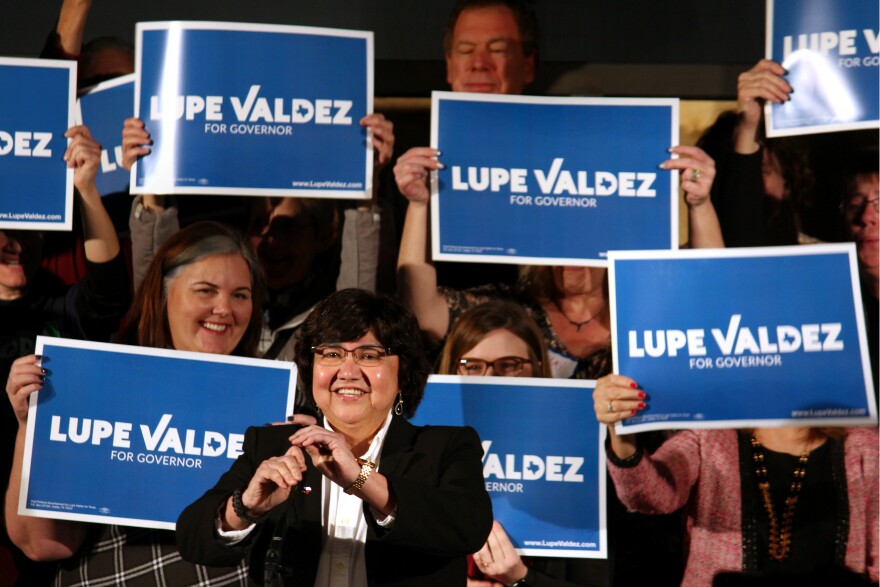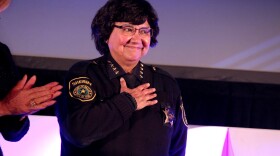For 13 years, Lupe Valdez was the Dallas County sheriff. She spent decades in law enforcement jobs before that. So when Valdez kicked off her campaign for governor, she started her speech with a joke.
“I’m Lupe Valdez,” she told a room packed with friends and supporters. “I wanted you to be sure to hear that because a lot of people don’t recognize me when I’m out of uniform.”
Of the nine Texas Democrats running for governor, Valdez is the only woman. Despite some high-profile appearances at Democratic events, Valdez is not much of a household name outside of Dallas County.
Now, as she introduces herself to voters around the state, she talks about her upbringing as the eighth child of migrant farm workers, and she points to her time as sheriff of Texas’ second largest county.
Taking over the jail
In any county’s budget, the local jail is the largest single expense. So the No. 1 job of any sheriff is to run the jail well. When Valdez took office in 2005, she inherited a Dallas County Jail that was in a bad state.
“I think the Department of Justice described it very well. They said, 'We’ve seen third-world countries that are in better condition than this,'” she said.
The building itself was in horrible shape. The year before, the jail failed to meet basic state standards for health and safety. It was overcrowded, underfunded and understaffed. And Valdez says there were personnel problems, too.
“I had to fire a handful of people before they got the message we do not beat up inmates anymore,” she said.

In 2007, the Department of Justice sued the county and the sheriff, saying the jail failed to protect inmates from serious harm, failed to administer adequate medical and mental health care, and failed to provide sanitary living conditions.
It took years before the jail started passing state inspections again. By 2010, the county had spent more than $138 million to build a new jail tower and overhaul the way the jail was run. And they brought in the local county hospital to serve the inmates.
Grading her tenure
John Wiley Price, a county commissioner for more than three decades, said fixing the jail was a group effort that took a lot of collaboration between different parts of the county government, and that Valdez was a “good, collaborative partner,” who was willing to innovate.
“She could have taken the position of some of her predecessors: ‘I’m in charge, I’m going to run this jail how I want to run it, and y’all be damned.’ But she listens. And at the end of the day, she understands, bottom line,” Price said.
For some who worked under her, though, Valdez’ tenure as sheriff didn’t feel so collaborative.
“Employees were very unhappy with her leadership. They did not feel like she was a good leader,” said Chris Dyer, president of the Dallas County Sheriff’s Association, which represents rank-and-file officers.
"I had to fire a handful of people before they got the message we do not beat up inmates anymore."
Dyer says he appreciates her public service and says she deserves a lot of the credit for fixing the jail. But he also felt like Valdez played favorites, and that she was more closed off than her predecessors. Many officers, he says, wondered if she had their backs.
“I would say morale’s probably lower now than when she came into office,” Dyer said.
Asked about morale, Valdez brushed off the concerns.
“How can you say that morale was down when you’re getting better pay, you’re getting better equipment, you’re getting the place cleaned up? One time when I actually challenged an officer about the complaints, he said, ‘Sheriff, I’m a cop. We were just born to complain,’” she said.
Solving the state's problems
Now, Valdez is crisscrossing Texas to meet voters. At a union hall in Hurst where she spoke to Democrats at a candidate forum, Valdez used the challenges she faced running the sheriff’s department to make her case for why she’d be the right pick for governor.
“When I was the sheriff, I couldn’t get six chiefs to agree on where we’re going to lunch. So I know we have problems,” she told the crowd. “But as long as these differences are used to divide, hurt and distract, we’re not building a better Texas.”

Outside the sheriff’s department, advocates for criminal justice reform wish Valdez had built a more just Dallas County.
“I haven't seen transformational leadership that our community deserves from Sheriff Lupe Valdez," says Sara Mokuria, who founded Mothers Against Police Brutality.
Mokuria says Valdez’s biggest black marks are deaths in the jail during her tenure. Between 2005 and 2016, 98 people died in custody of the Dallas County Sheriff’s department, most of them inside the jail.
“When you have a death-in-custody rate, on average, being one person dying every six weeks, to me it’s unacceptable,” she said.
Valdez says each death is a tragedy, but that it’s important to understand that upwards of 100,000 people are booked through the jail each year. When compared to statistics on inmate deaths in jails nationwide, Dallas County’s death rate is well below average.
Between 2005 and 2016, 98 people died in custody of the Dallas County Sheriff's department, most of them inside the jail.
While there’s always room for improvement, Valdez says systemic change takes time, but she’s proud of expanding services for inmates like classes and job skills programs.
“I had one guy in tears say to me, ‘You guys saved my life,’” she said. “He said, ‘You all saved my life, you put me in there, we got into skills, now I own my own business. I think I needed someone to force me to look at things.'"
As governor, Valdez said she’d draw on her experience in law enforcement to bring people together around criminal justice reform and all of the issues facing Texas.
More: Find information on your races and candidates in our voter guide.





